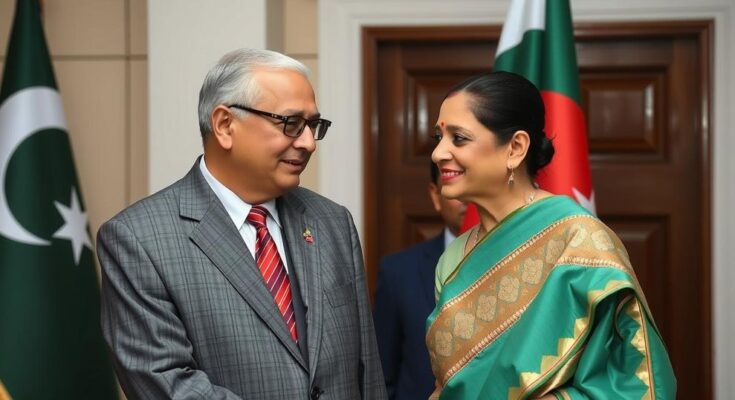Pakistan’s Foreign Minister Ishaq Dar is set to visit Bangladesh for the first time in over a decade, indicating improved relations after the ousting of Prime Minister Sheikh Hasina. The interim Bangladeshi government, led by Muhammad Yunus, has agreed to visit Pakistan. Recent diplomatic changes suggest a thawing of long-strained ties, including enhanced trade and lifted travel restrictions for Pakistanis seeking to visit Bangladesh.
Pakistan’s Foreign Minister Ishaq Dar is scheduled to visit Bangladesh next month, marking the first such visit to the neighboring country in over a decade. This diplomatic engagement signifies a potential thaw in relations between Dhaka and Islamabad following the change in leadership in Bangladesh after the ouster of Prime Minister Sheikh Hasina in August 2024. During a press conference in Islamabad, Minister Dar confirmed his trip to Dhaka, scheduled for February, at the invitation of his Bangladeshi counterpart. Moreover, the interim government chief adviser of Bangladesh, Muhammad Yunus, has agreed to reciprocate by visiting Islamabad on mutually arranged dates.
The strained relations between Pakistan and Bangladesh have historically been exacerbated during Sheikh Hasina’s 16-year administration, as she favored closer ties with India. Her government’s reluctance to strengthen relations with Pakistan was attributed to her alignment with Indian strategic interests. However, since the recent leadership change in Bangladesh, there have been indications of improving ties, including high-level exchanges and the lifting of restrictions on Pakistani exports. This shift has resulted in increased bilateral trade, including the establishment of direct trade routes between the two nations.
At the aforementioned press conference, Minister Dar referred to Bangladesh as a “brother country” and expressed Pakistan’s willingness to offer comprehensive support to Dhaka. Additionally, a significant policy change recently allowed Pakistani citizens to apply for Bangladeshi visas without the requirement of prior security clearance, a development that may have implications for regional security dynamics in India’s northeast, particularly in light of concerns relating to extremist groups. Furthermore, the timeline surrounding this policy change coincided closely with significant high-level political interactions, including a meeting between Pakistan’s high commissioner and opposition leader Khaleda Zia, who represents the Bangladesh Nationalist Party (BNP), known for its historically favorable stance towards Pakistan.
The recent political upheaval in Bangladesh has strained relations between Dhaka and New Delhi, particularly since the exiled Hasina’s departure. Nobel Peace Prize laureate Muhammad Yunus’s rise to authority has further complicated these dynamics, as there have been reports of unrest and tensions, particularly concerning the Hindu community within Bangladesh and the treatment of Hindu leaders. In light of these developments, the interim government has also taken steps to officially request Hasina’s return to Bangladesh, further indicating a turbulent and shifting political landscape in the country.
The complex diplomatic relations between Pakistan and Bangladesh have often been influenced by their historical context and shifting political landscapes. Following the independence of Bangladesh in 1971, former West Pakistan and the nascent Bangladesh maintained a fraught relationship for decades. Sheikh Hasina’s tenure as Prime Minister was characterized by alignment with India, which often led to strained interactions with Pakistan. With Her recent ousting and the ascent of Muhammad Yunus, the geopolitical dynamics in the region have shifted, fostering a new opportunity for engagement between the two nations that have historically viewed each other with suspicion. The recent diplomatic maneuvers signify a broader trend of reevaluated foreign alliances in South Asia.
In conclusion, the scheduled visit of Pakistan’s Foreign Minister Ishaq Dar to Bangladesh marks a significant potential shift in bilateral relations, especially after years of tension under Sheikh Hasina’s government. With recent changes in leadership and policy adjustments, particularly regarding trade and travel, both nations appear to be setting a course toward improved diplomatic ties. The potential reciprocal visit by interim Bangladeshi leader Muhammad Yunus to Islamabad further underscores the commitment to strengthening bilateral relations. Ultimately, these developments reflect a broader geopolitical reconfiguration in South Asia, promising new avenues for cooperation and dialogue.
Original Source: www.business-standard.com




